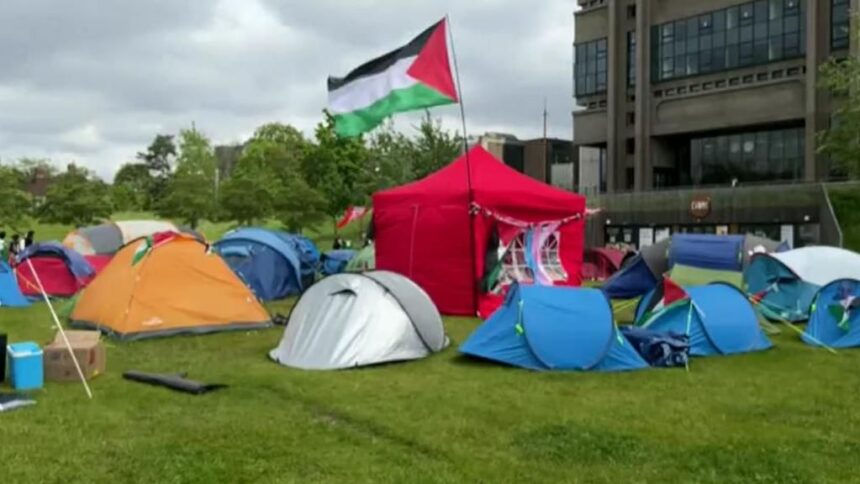Only 12 out of 36 encampments were active by the end of May, as protestors fought to stay.
The student encampments that erupted on UK campuses in protest against the Gaza wars are declining in number and intensity, notwithstanding the hostility from the university administration.
By the end of May, about 12 out of 36 England, Wales, and Scotland encampments were still active. Protestors are fighting legal battles to stay at many remaining locations, including London, Bristol, and Birmingham.
On Friday, the University of Nottingham became the latest institution to appeal to the courts, requesting a judge in London issue a possession order to enable it to remove an encampment of about ten tents.
A country court rejected Bristol University’s request for a possession order in favor of a further hearing later this month. The high court will rule on the orders requested by Nottingham and Birmingham universities next week.
Students who have been protesting at Queen Mary University of London (QMUL) since May stated they are directed to stay even though universities have scheduled an eviction court hearing next week. Many encampments have closed or gone into dormancy.
According to a 21-year-old Palestinian student, “I think it’s disgusting that they have decided to take us to court before even making an effort to talk things out with us.” “It’s very telling of this university that when students are protesting for a humanitarian cause their immediate reaction is to take us to court, rather than actually sit with us.”
The students stated that sleeping on an east London lawn with about 20 people in the camp has many challenges, but the relationships formed between participants and the Tower Hamlets neighborhood make it worthwhile. People within the locality even assist in bringing food to the site.
The protestors demand that QMUL end its ties to companies like BAE Systems and Barclays. According to the university spokesperson, the encampment’s closure was necessary due to health and safety concerns.
The spokesperson added, “We have asked the encampment to disperse multiple times because of these risks. They have ignored our request. The serious nature of health and safety has given us no option but to take legal action to dismantle the camps.
Following the violent scenes at the US campuses, UK vice-chancellors hoped that their encampment would disappear this summer when a ceasefire or peace agreement was reached between Israel and Hamas.
The encampment’s behavior has declined, as evidenced by the frequent abuse directed at the members of the staff with abusive language and being followed around campus. We are dedicated to doing everything we can to ensure our students and staff have a warm and secure learning environment.
Other universities have also expressed concerns over non-students moving in. Newcastle University informed its protestors it aimed to start legal action after “criminal damage” spread beyond the encampment.
“What started out as a peaceful demonstration led by students has become a focus for activism, attracting some individuals who are not connected with the university,” Newcastle stated.
Some encampments have closed due to legal threats; one such encampment is at the University of Leeds, where a student group has vowed to return in September.
Leeds University’s spokesperson stated that the university leaders had listened to the issues raised by the students. However, after six weeks of protest, disruption, occupation, and disruption, we commenced legal proceedings to obtain a possession order. We welcome the camp’s decision to end the encampment freely.”
Some encampments remain intact in other places, but few protestors live there. “More tents than students now,” a university official stated.















